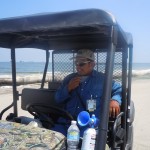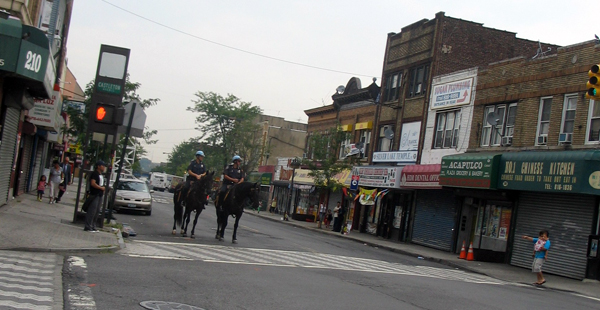
Mounted police officers patrol Castleton Avenue in Staten Island. (Photo: Cristina DC Pastor)
STATEN ISLAND, New York – On a recent weekday morning the corner of Castleton and Port Richmond Avenues was like any New York City neighborhood that routinely wakes up early. Deli shops served coffee to a stream of people, commuters raced to catch the bus that would take them to the ferry terminal, day laborers chatted on the sidewalk.
This is where a series of brutal assaults against Hispanic immigrants – 11 incidents over a five-month period, according to reports – have been committed. The most recent victim was Christian Vasquez, 18, who was mugged July 31 on Port Richmond Avenue on his way home from work at a Manhattan restaurant. Vasquez said his attackers shouted hateful anti-Mexican slurs. A Liberian immigrant has been arrested in the case and could face up to 25 years in prison.
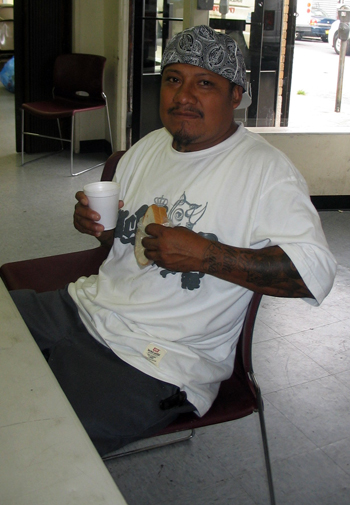
Mario Billegas, a Mexican immigrant on Staten Island. (Photo: Cristina DC Pastor)
Mexican immigrant Mario Billegas, 40, preferred to sit inside the safe space of El Centro de Hospitalidad Community Center on Castleton Avenue and watch TV with fellow construction workers. He was enjoying a free breakfast of black coffee and buttered bread.
“It’s terrible,” he began. “They blame us because we always work.”
Billegas, a father of four was airing his thoughts on bias crimes being committed against Hispanics in the community. His wife is freaked out over the Vasquez case, he said. She worries about their four sons, two of them teens, 14 and 17 years old.
“She wants to pull them out of Richmond High and transfer them,” he said shaking his head. “She says something might happen.”
Billegas said he knew a couple of the other victims. They are ordinary family men like him, “always working, because if we don’t work where will we get the money to support our family?”
“I was mad,” he said when he learned of the most recent assault, “but there’s nothing I can do.”
El Centro – founded five years ago by the Latino Civic Association, Project Hospitality and St. Mary’s of the Assumption Roman Catholic Church — offers free breakfast to low-income families, and extra clothing during the winter. On Thursdays, there’s free food all day, courtesy of local pizzerias, donut and deli stores, and there’s more than enough beans and rice for everyone, said Billegas.
Jose David Carillo, 37, who manages El Centro, said people are often afraid to go to the police to report an incident.
“They don’t say anything, they’re just quiet,” he said.
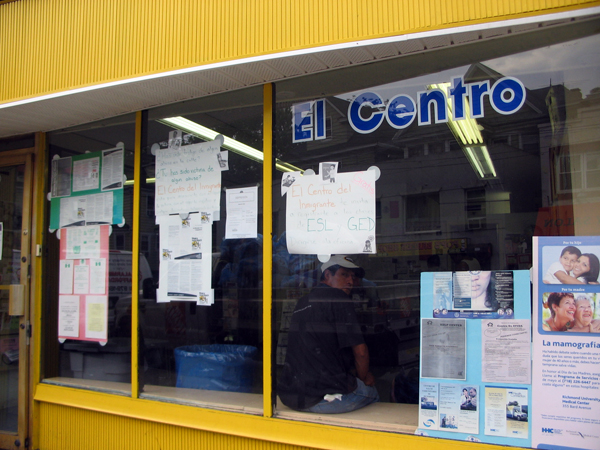
El Centro de Hispanidad Community Center. (Photo: Cristina DC Pastor)
It’s only when the beatings are serious enough to land them in the hospital that immigrants grudgingly make a police report, Carillo said.
While the Latino community reels from the shock of serial attacks on their menfolk, the visibility of uniformed police around the neighborhood has increased. Three NYPD officers stopped by El Centro to chat up the day workers in Spanish and to distribute fliers on “Nightlife Safety Tips.” The handout urges people to:
- Always carry a cell phone;
- Never leave a bar or club with a stranger;
- Use the buddy system, walk with a friend and always watch each other;
- Always carry enough money for a cab;
- Always inform a family member/friend of your whereabouts;
- Be familiar with surroundings (street names and landmarks) – information that will be needed to locate you;
- Use well-populated, well-lit streets, stay away from deserted blocks, head for an area where there are people or open stores.
Outside the center, a female police officer paced back and forth near a bus stop with a long line of commuters, while mounted officers patrolled nearby. The day workers taking a break at El Centro were quick to support the increased police presence.
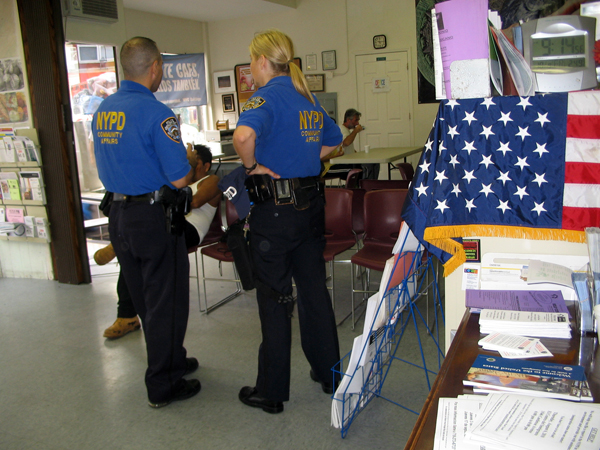
Cops checking in at El Centro, a Hispanic community center. (Photo: Cristina DC Pastor)
“They’re OK,” said Billegas. “They don’t harass people. As long as you have IDs, you’re OK.”
These day laborers generally work project-to-project and receive IDs from their employers. Typically, they wait on street corners for a van to transport them to job sites. (That’s in contrast to other types of day workers who loiter outside construction stores waiting for small, odd jobs to come their way.)
The men on Castleton and Port Richmond say they are generally paid “on the books” $400 to $500 a week, but they only find work three days a week, at most.
“We pay taxes,” said Billegas, who works in construction, says he likes his boss, and pays $1,200 monthly rent for his apartment.
Police said many of the suspects in the attacks are African American. Some journalists speculate the rise in racial tension here is due to the increased competition for dwindling jobs during the recession. Others say Hispanics are easy targets because they are known to be quiet and uncomplaining.
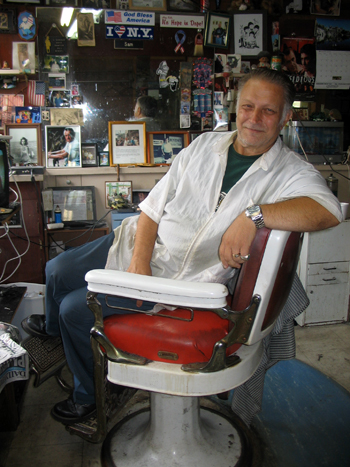
Sam Marcucci, a barber in Port Richmond. (Photo: Cristina DC Pastor)
But a July 28 community rally in Port Richmond was organized to send a message that Hispanics can no longer remain passive.
“If the attacks continue, Mexicans will defend themselves, and the situation could become even uglier,” said Ana María Archila, executive director of Make the Road New York, which organized the rally. “We have to act decisively to avoid this happening.”
Anti-immigrant feeling is by no means universal in the neighborhood. Sam Marcucci, whose barbershop is just across from El Centro, said Hispanic immigrants never caused trouble for his business.
“They come here, get a haircut, they pay, they leave,” he said. “If they can’t pay, they promise to come back with the money–and they do come back with the money.”
“I came to Staten Island from Italy 52 years ago,” said Marcucci, 66. He doesn’t think it’s right that Hispanics or any immigrant group should be singled-out for the current economic difficulties.
“We are all immigrants. We should all get along.”



